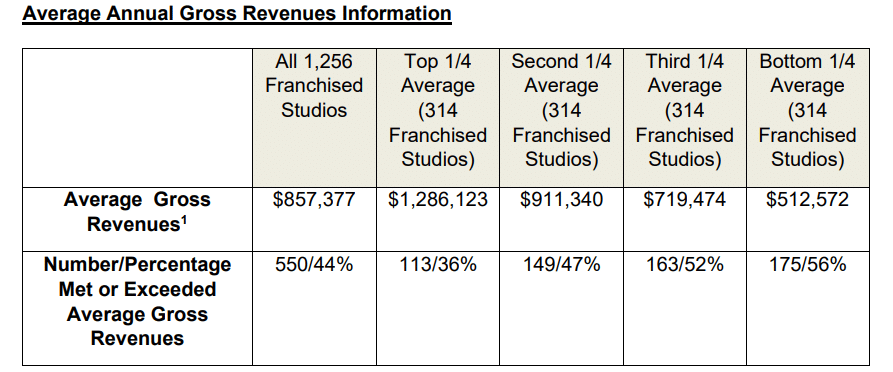Orangetheory Fitness Franchise FDD, Profits & Costs (2025)

Orangetheory Fitness, founded in March 2010 by exercise physiologist Ellen Latham, along with Jerome Kern and David Long, quickly became a leading name in the fitness industry. The concept grew from Latham’s Pilates studio, “Ellen’s Ultimate Workout,” in Fort Lauderdale.
Headquartered in Boca Raton, Florida, Orangetheory began franchising in 2010. It gained recognition for its innovative heart-rate-based group workouts, blending fitness with science to boost metabolism and energy.
Orangetheory’s unique approach and rapid growth earned it spots in Inc. magazine’s “Fastest-Growing Private Companies” and Entrepreneur’s “Franchise 500” list.
Orangetheory Fitness Franchise Initial Investment
How much does it cost to start a Orangetheory Fitness franchise? It costs on average between $822,000 – $1,377,000 to start a Orangetheory Fitness franchised studio.
This includes costs for construction, equipment, inventory, and initial operating expenses. The exact amount depends on various factors, including the type of facility you choose, the location, and whether the franchisee chooses to lease or purchase the property.
| Type of Expenditure | Amount (Low – High) |
|---|---|
| Initial Fee | $59,950 – $59,950 |
| 3 months rent + security deposit | $21,042 – $37,408 |
| Architect & Design Fees | $10,000 – $17,000 |
| Furniture, Fixtures & Equipment | $14,215 – $14,978 |
| Office & Cleaning supplies | $3,500 – $4,500 |
| Leasehold Improvements and Construction Costs | $380,000 – $766,500 |
| Fitness Equipment and OTbeat System | $105,908 – $193,053 |
| Technology – Software Licensing Fee | $4,495 – $4,495 |
| Initial Inventory of Fitness Retail Merchandise | $3,315 – $5,850 |
| Interior and Exterior Signage | $10,000 – $15,000 |
| Technology System | $41,429 – $55,808 |
| Pre-Sale and Grand Opening Advertising | $36,000 – $45,000 |
| Initial Training/Presales Training, plus expenses | $6,250 – $7,600 |
| Miscellaneous Opening Costs | $6,274 – $11,274 |
| Insurance | $3,500 – $5,000 |
| Additional Funds – 3 Months | $115,744 – $133,744 |
| TOTAL ESTIMATED INITIAL INVESTMENT | $821,622 – $1,377,160 |
Average Revenue (AUV)
How much revenue can you make with a Orangetheory Fitness franchise? A Orangetheory Fitness franchised studio makes on average $808,000 in revenue (AUV) per year.
Here is the extract from the Franchise Disclosure Document:

Download the Franchise Disclosure Document
Frequently Asked Questions
How many Orangetheory Fitness locations are there?
As of the latest data, there are 1,298 Orangetheory Fitness locations in the United States, with 1,283 locations in the United States that are franchise-owned. The state with the most locations is California, which has around 160 studios, accounting for 12% of all U.S. locations.
The brand continues to grow globally and recently merged with Self Esteem Brands, the parent company of Anytime Fitness, creating a combined fitness chain of over 7,000 locations worldwide.
What is the total investment required to open a Orangetheory Fitness franchise?
The total investment required to open a Orangetheory Fitness franchise ranges from $822,000 to $1,377,00.
What are the ongoing fees for a Orangetheory Fitness franchise?
Orangetheory Fitness franchisees are required to pay an 8% royalty fee on gross sales. In addition, franchisees must contribute a 2% national marketing fee based on gross sales to support system-wide advertising and marketing efforts. This fee covers branding and promotional activities at the national level.
What are the financial requirements to become a Orangetheory Fitness franchisee?
To become an Orangetheory Fitness franchisee, the financial requirements include having a minimum net worth of $500,000 and liquid assets of at least $150,000. These requirements ensure that potential franchisees have the financial stability to cover initial investments and operational expenses during the early stages of the business.
How much can a Orangetheory Fitness franchise owner expect to earn?
The average gross sales for a Orangetheory Fitness franchise are approximately $0.81 million per location. Assuming a 15% operating profit margin, $0.81 million yearly revenue can result in $122,000 EBITDA annually.
Who owns Orangetheory Fitness?
Orangetheory Fitness is currently owned by Roark Capital Group, a private equity firm that invested in the brand in 2016 to support its growth.
In 2024, Orangetheory Fitness merged with Self Esteem Brands, the parent company of Anytime Fitness, forming a larger fitness franchise entity. Despite the merger, Orangetheory Fitness continues to operate under its established brand and model.
Disclaimer
Disclaimer: This content has been made for informational and educational purposes only. We do not make any representation or warranties with respect to the accuracy, applicability, fitness, or completeness of the information presented in the article. You should not construe any such information or other material as legal, tax, investment, financial, or other professional advice. Nothing contained in this article constitutes a solicitation, recommendation, endorsement, advertisement, or offer to buy or sell any franchises, securities, or other financial instruments in this or in any other jurisdiction in which such solicitation or offer would be unlawful under the franchise and/or securities laws of such jurisdiction.
All content in this article is information of a general nature and does not address the detailed circumstances of any particular individual or entity. Nothing in the article constitutes professional and/or financial and/or legal advice, nor does any information in the article constitute a comprehensive or complete statement of the matters discussed or the law relating thereto. You alone assume the sole responsibility of evaluating the merits and risks associated with the use of any information or other content in this article before making any decisions based on such information or other content.




